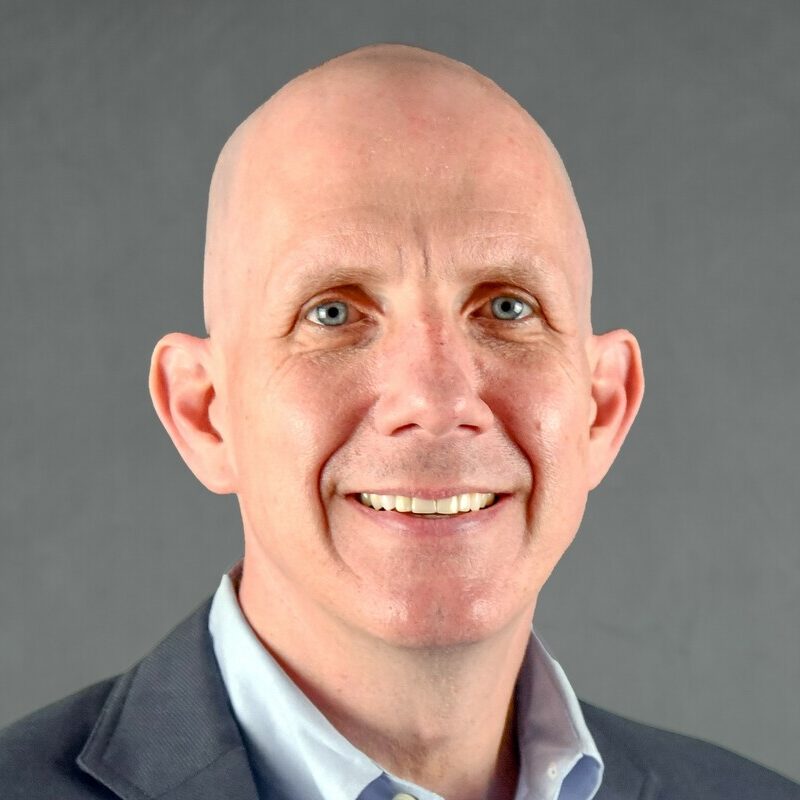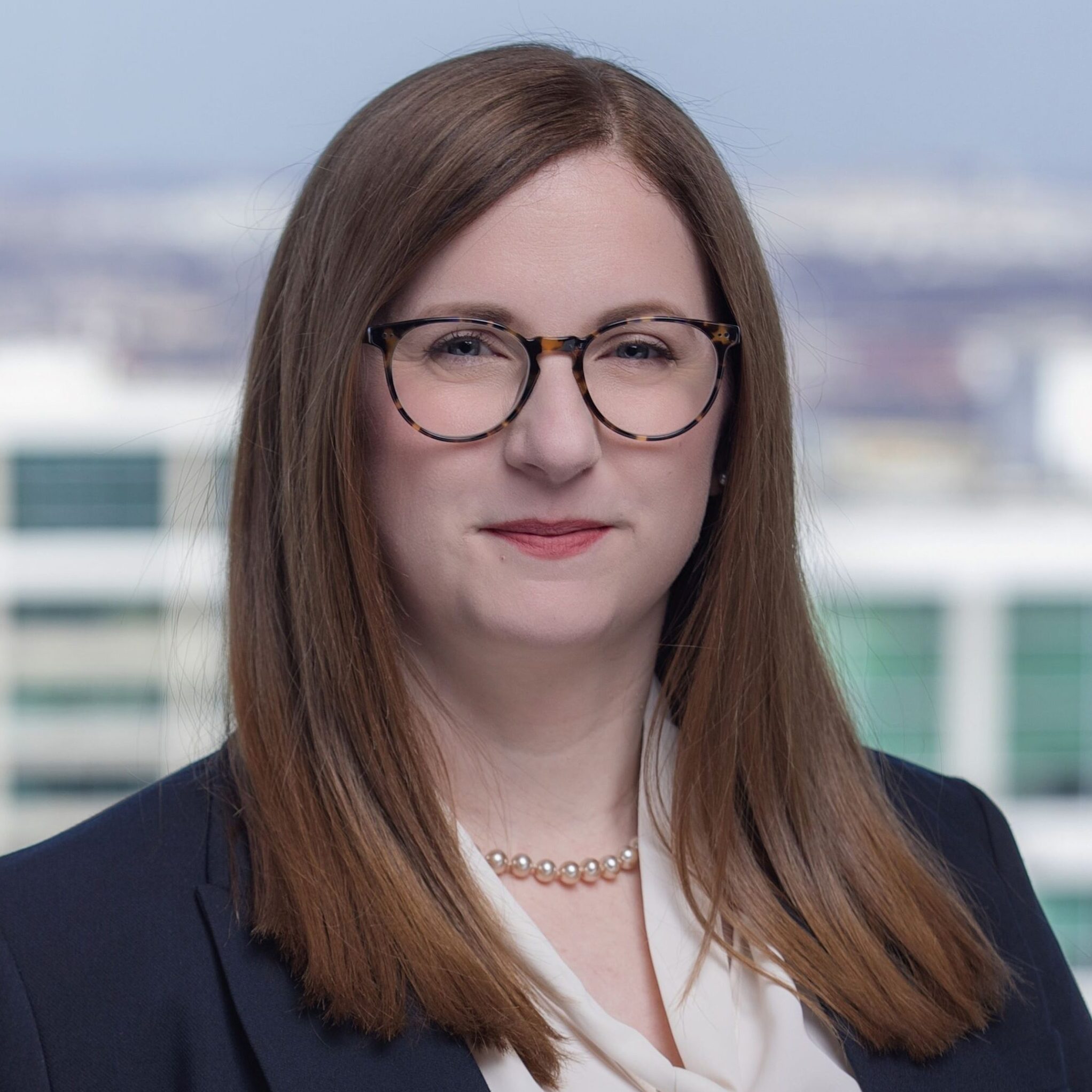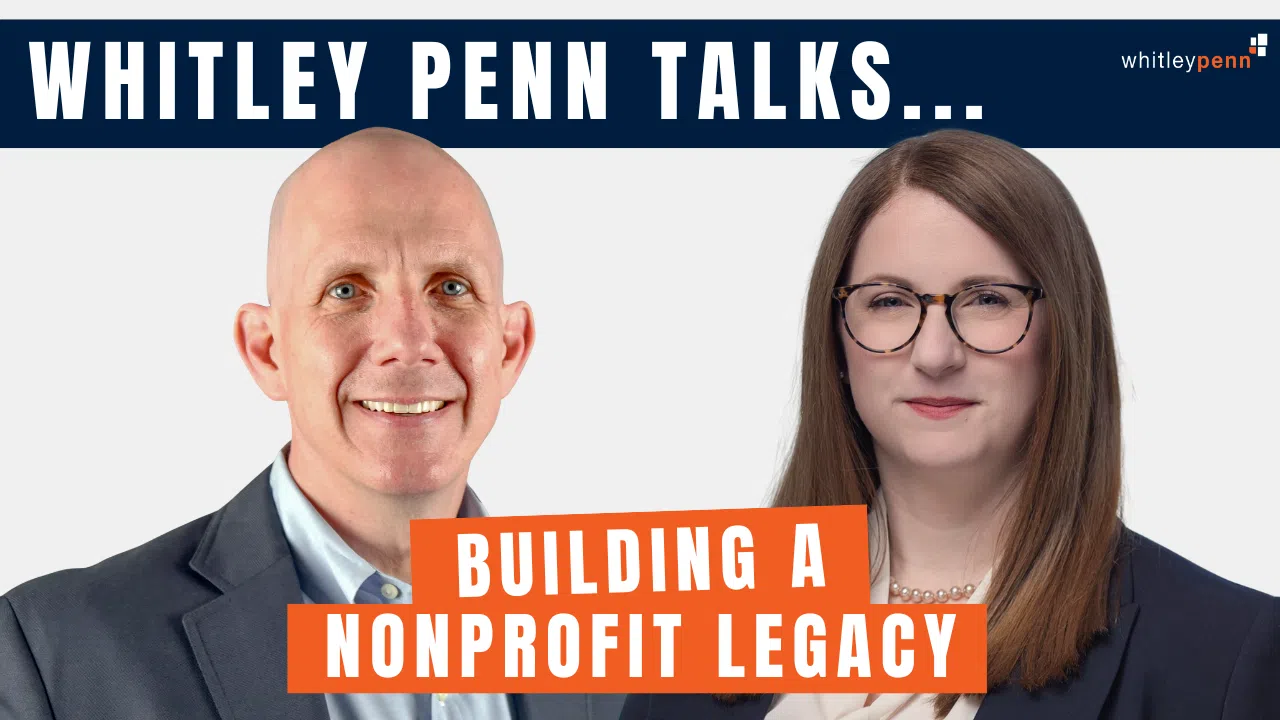Whitley Penn Talks:
Building a Nonprofit Legacy with Jason Ray, CEO of Clayton Youth
Whitley Penn Talks: Building a Nonprofit Legacy with Jason Ray, CEO of Clayton Youth
Nonprofits today face growing challenges, from funding uncertainty and increased competition with for-profit providers to shifting school demographics and economic pressures. In this episode of Whitley Penn Talks, host Emily Landry speaks with Jason Ray, CEO of Clayton Youth Enrichment, about how the organization is navigating these changes while continuing to serve thousands of children across North Texas. Learn how their innovative life skills curriculum, ClaytonQuest, is preparing kids for great lives and how you can support their mission by attending the upcoming Courage to Climb 70s-themed anniversary celebration.
Topics Discussed:
- How nonprofits are navigating a rapidly changing landscape with funding uncertainty
- Clayton Youth’s mission and how empathy and life skills are central to youth development
- With federal funding in limbo and scholarship resources stretched thin, community support is more vital than ever
Listen to this episode on Spotify or Apple Podcasts. Click here to view the episode transcript.

Jason Ray
CEO, Clayton Youth Enrichment

Nonprofits today face growing challenges, from funding uncertainty and increased competition with for-profit providers to shifting school demographics and economic pressures. In this episode of Whitley Penn Talks, host Emily Landry speaks with Jason Ray, CEO of Clayton Youth Enrichment, about how the organization is navigating these changes while continuing to serve thousands of children across North Texas. Learn how their innovative life skills curriculum, ClaytonQuest, is preparing kids for great lives and how you can support their mission by attending the upcoming Courage to Climb 70s-themed anniversary celebration.
Topics Discussed:
- How nonprofits are navigating a rapidly changing landscape with funding uncertainty
- Clayton Youth’s mission and how empathy and life skills are central to youth development
- With federal funding in limbo and scholarship resources stretched thin, community support is more vital than ever
Listen to this episode on Spotify or Apple Podcasts. Click here to view the episode transcript.
Get new episodes straight to your inbox
Get new episodes straight to your inbox
You might also enjoy...
Episode Transcript
Emily Landry (00:00)
Hello everyone, welcome to Whitley Penn Talks where we give you valuable insight to help you make confident informed decisions and move your business forward. My name is Emily Landry and today we are talking about how Clayton Youth is shaping our community’s future leaders. I’m excited to be joined by Jason Ray, CEO of Clayton Youth Enrichment to bring insight to this topic. Welcome Jason. Nice to be with you.
Jason Ray (00:36)
Thank you, Emily. Good to be with you.
Emily Landry (00:40)
Jason, can you tell us a little bit about your background and what brought you to Clayton Youth?
Jason Ray (00:44)
Sure, sure. Hi, thank you. ⁓ I was at TCU as a freshman and learned about an internship in Washington, D.C. and I was really interested in politics, but I didn’t know how I was going to pay for it. So I went to an introductory session and they explained that if I went to a non-profit there was a $500 stipend. Well, at the time I didn’t know what a non-profit was, but I knew how important $500 was for me to get to go to D.C. and so I took the internship with United Way International and was introduced to nonprofits, caught the bug, spent 17 years at Big Brothers Big Sisters and left there in 2015 and came to Clayton later in 2015.
Emily Landry (01:22)
Wow, all for $500 to get to go to Washington, D.C. I love it. So for people who are just being introduced to your organization, Clayton Youth Enrichment has been a pivotal part of our Fort Worth community for decades. Can you share the mission and history of the organization?
Jason Ray (01:31)
Sure. Yeah, Clayton might be the largest nonprofit based in Fort Worth that your listeners have never heard of. We are based in schools and most of our work is done at school. At the end of the school day, kids leave the classroom. Instead of going to the bus, they go to the cafeteria. Our staff is there to meet them and we give them enrichment programming until mom or dad picks them up some six or 630 each afternoon. That’s the bulk of what we do.
And our job is to enhance the social academic learning of kids. And we’ve chosen to do that in ways I’m sure we’ll talk about today through our curriculum called Clayton Quest. But we started that program in 19 this program in 1975 at Lily B Clayton Elementary. That school was on the verge of closure and some parents rallied to say how can we save our school? And the solution they came up with was to provide an a before and after school offering for women going into the workforce in the hospital district who needed child care before and after school. That idea caught on and we went from 27 kids in 1975 to almost 8,000 kids last year.
Emily Landry (03:00)
Whoa, 8,000 kids. It’s remarkable. So you’ve been serving North Texas for 50 years. I can do math, 1975 to 2025. What are some of the biggest milestones or transformations you’ve seen over that time? Obviously, explosive growth from one campus to however many it takes to get to 8,000 students, lots of other things too, I’m sure.
Jason Ray (03:23)
Yeah, certainly, certainly. In the last few years, just before I arrived, Clayton had moved into the early childhood space with a center near Southside. We continue that work with a center at Broadway Baptist Church today. And we’re, this next month, opening a center in Keller that’s going to serve teachers and their children, as well as the community, for children zero to five years old. So, really excited about that new center we’re opening up.
Beyond that, I’m sitting in our Clayton Community Center in East Fort Worth where we’re providing services directly to the community. then in the last, since last five or so years, we’ve been doing school day enrichment. So we’ve taken our after school program and brought it into the school day, giving teachers in some select Fort Worth ISD schools a break or some planning time during the day while we take over the classrooms and bring after school to school day.
The biggest change though in Clayton’s history was around 2000. Prior to that from 1975 to 2000, we were serving only fee based programs like our one originally at Lilly B Clayton where parents pay for the program. In 2000, we started serving kids in free programs. So working with Fort Worth ISD, we brought kids in in high need schools where they didn’t pay anything and working with the school district, they were able to subsidize the cost of the program. 14 years ago, Clayton really got into that space by securing a federal grant called the 21st Century Community Learning Center Grant. that allowed us to go to, depending on the year, nine or 10 really high need schools and provide a really robust after school enrichment program.
Ironically, as we’re recording this, funding for that 21st century Community Learning Center program is on hold. It’s on review by the OMB at the federal level. So our program and thousands of programs across the country are sitting here in limbo waiting for August 1st to know if we’re to be able to run programs at those schools. And we’ve got a lot of parents, about a thousand parents in those programs where we need to say, hey, by the way, Mom, Dad, your, your child may not get services at these schools because the funding has been held up.
Emily Landry (05:28)
Mm-hmm.
Jason Ray (05:50)
So big change, unfortunately, comes with some challenges in this environment.
Emily Landry (05:50)
Wow. It does. I was reading some literature earlier today about the new tax legislation and some of the things that we’re trying to accomplish with the tax legislation, but then some of the things that I think people forget how many things our nonprofits do in our community and how tough it is to provide those services without revenue ending up at the nonprofits where it’s needed.
It’s going be interesting to see just how this affects so many different nonprofits throughout the country and how they’ll, you know, you’ll always end up pivoting and doing so well. You’re able to make magic happen with sometimes so very little, but ⁓ sure would be nice if we could get you some donor dollars today too.
Jason Ray (06:43)
I appreciate it. What’s really one of the things that attracted me to Clayton was it’s truly a social enterprise and it started off that way where we earned fees from parents like we did in 1975 at Lillie B. Clayton Elementary and those parent fees paid for the program and as we’ve grown we’ve been able to take those parent fees that we earn across Fort Worth, Keller and Crowley school districts and reinvest that into scholarships for kids who can’t afford it or to support our free programming. And in this changing economic environment, it’s harder than ever to have that net income that allows us to invest back into scholarships. It’s a really fast changing environment, really over the last five years since COVID hit. And we continue to work on ways to adapt to that.
Emily Landry (07:37)
I think that that’s gonna be a key theme for so many organizations and you’ve got it right. It feels like that’s been very accelerated since COVID just to see how people have had to adapt and had to adjust to make things work. So I’d like to hear more about Clayton Quest, the life skills curriculum. So what makes it unique? How do your kids respond to it?
Jason Ray (08:07)
Well, when I first came to Clayton, one of my first tasks was to survey a bunch of my educator friends with the question, if you were starting an after school program and could do whatever you wanted, what would you do? And got a lot of responses, but there was a little bit of a common theme. And a principal at Lamar High School in Arlington gave me an answer that I’ve held on to since, well, it’s almost 10 years ago that he shared that thought with me. He said, “Jason, thanks for asking the question. There’s value in teaching kids anything…Where I would focus all of my efforts is in the development of empathy and conscientiousness, which requires close supervision and real-time coaching. Helping kids appreciate that their words and actions affect those around them and themselves is extraordinarily important.”
The biggest impediment in public education, in my opinion, is a child’s inability to put another’s perspective or needs before their own. And that sense of using this after school time where we have a blank canvas of how we spend time with kids and what they take away from it, saying, you know, we’ve got educators during the school day, they’re going to teach reading, writing, arithmetic.
We can support that in small ways, but what we can really embrace is our role to say, know, Johnny at home as a fourth grader is little brother, but when he gets to the after school program and he’s in a group with second and third graders, now he’s the big kid and he gets to experience that and be a role model for the younger kids that he doesn’t get to do that at home. Those kind of time opportunities mixed with our ClaytonQuest curriculum that you ask about is a really powerful combination. And so we’ve taken, I like to say, we hide the vegetables in the dessert. So kids are having fun. They don’t know they’re learning. But my favorite exercise that we do is one, it’s a lesson around lightning bugs. And kids get a chance to, first of all, they learn about what a lightning bug is. Then they make a lightning bug. So a craft activity.
We put some science behind it as they complete the circuit to put the light on their lightning bug. And then the magic starts happening when we take two groups of kids and put them on opposite sides of the room and they flash signals to each other as if they were two lightning bugs communicating. Well, without a script and knowing what two flashes means versus three flashes, it’s frustrating. But then we bring the kids back together and it’s a chance to talk about communication and how can we listen better and what can we do to make sure we’re understanding what someone else is trying to tell us. And so they’ve gotten everything in a lesson that they just thought was fun playing with bugs that light up. And so this ClaytonQuest, we developed it. We’ve got three years worth of curriculum. In fact, we have seen other nonprofits show interest in some recently bought copies of it to use in their programs, which we’re really excited about.
Emily Landry (11:15)
That’s really cool. I love that idea. My brother teaches sixth, seventh, and eighth graders. he loves that time, but I think a lot of people find that time to be a little bit challenging. And I can’t wait to tell him about that. He does talk about it a lot. The communication that they get modeled for them at home does affect the classroom and then just the way they treat each other.
I can see how empathy and learning those skills, that’s tough to teach inside of a classroom where you have so much to get through for standardized curriculum or mandatory testing or other things that you need to accomplish, but you can maybe support some objectives for the reading, writing, and arithmetic in an after school program through some of those excellent endeavors.
Jason Ray (12:21)
Yeah, well we believe and our vision statement for Clayton is we prepare children for great lives and the way we prepare them are those soft skills that, you know, it’s hard to squeeze that into the school day. Meanwhile, even at the elementary age, which is where we focus most of our work, that cell phone is the medium of communication and that doesn’t always build a lot of great habits and skills. And so in after school we get a chance to just have two to three hours each school day to really emphasize interpersonal interactions and how to do that well and also take it controlling themselves and their emotions. We have CLIMB, which is our acronym and that stands for consideration, leadership, always forget independence, mindfulness, and building relationships.
And so if we can work on those five things, they’re prepared to be better students during the school day, better kids at home, and ultimately better leaders in the community.
Emily Landry (13:28)
That’s so powerful.
Jason Ray (13:31)
And we’ve got, we have kids as much as 2000 hours a year in our programs. And so how great is it that we’re able to spend that time very intentionally growing those skills.
Emily Landry (13:44)
Right, and I think too, like you said, I even think about myself, the stone at myself, not at someone else here. The screen time reports you get weekly and you think, oof, how did I choose to spend my week last week? Maybe not in the best, most positive way. I could have spent that a little differently. Maybe they’re also developing some better habits of how they choose to invest in themselves and in each other, would hope, too. Developing some lifelong friendships.
Jason Ray (14:18)
Absolutely.
Emily Landry (14:20)
Wow. So what are some of the biggest challenges facing youth-based nonprofits? I mean, obviously, some funding related issues could be very significant in this upcoming year, but are there any other challenges you see?
Jason Ray (14:37)
You know, you touch on tax implications and things of that nature and you’re going to know better than I any short-term effects of that. For us in our space, competition is important because we have for-profits who look at after-school programming in certain communities and see a revenue generating opportunity.
And so we find ourselves competing in some of our important school districts with for profits who have much jazzier marketing and we have to convince the school district that staying local, staying nonprofit is the right answer for them. And so it’s an interesting dynamic that I’m not sure a lot of nonprofits deal with, but for us, that is a major challenge. And of course we know what happens when for profits take have profits to reinvest with stakeholders. We’re proud to reinvest ours back into the community and scholarships and free programming for kids who really need it.
Emily Landry (15:36)
That’s great. And a tough challenge to take up. I think, you know, there’s quite a bit happening with public schools in Texas and that’s probably not one of your smallest challenges to deal with either.
Jason Ray (15:51)
No, absolutely. We’ve had a fantastic business model that worked just great. And with elementary schools getting smaller as kids have more options for charter schools, private school, homeschooling, you marry that with lower birth rates and even a fast growing community like Tarrant County is seeing school-aged kids’ drop, especially in our large urban districts. And so it is a changing environment and one that we’re working hard to catch up with and figure out what’s the next strategy.
Emily Landry (16:17)
Mm-hmm.
That sounds like not a small challenge, but one that you’re probably very well suited for after all those years of experience. Yeah. So dreaming big, what’s one thing you’d like to see Clayton achieve in the next five years?
Jason Ray (16:35)
Well, thank you. We’ve got a great team.
Hmm. I might give you two. You know, growing our services beyond Tarrant County is really interesting for us. We’re in such a great growth area, but going to the suburb, the rural communities that are growing fast is an interesting strategy for us to grow with some districts. We started in Keller ISD in 1993 with three elementaries and just grew with them up to 23 elementaries that they have today.
That’s an important strategy for us to look into. And the other is ClaytonQuest. We believe that because it was designed specifically for after school programs, ⁓ it’s unlike anything that’s out there. And so we are promoting that to other organizations and see that as a way for us to reach more kids indirectly by other agencies using ClaytonQuest as their after school curriculum. And so we’re looking for ways to promote that to other agencies.
Emily Landry (17:49)
I think that’s another creative way too to not just perhaps increase revenue when revenue might be in a shortfall, but also to really spread your mission and increase your reach. And maybe not just this community, but who knows, maybe it goes to a totally different state and expands the reach far beyond what the original founders envisioned when they created the organization.
Jason Ray (18:19)
That is right on the money and we would be very proud, as equally proud of doing it through others rather than doing it ourselves.
Emily Landry (18:24)
Sometimes it’s easier that way too, right?
So before we finish this episode, can you let us know how we can connect with you and how our audience could get involved?
Jason Ray (18:39)
Certainly, thanks for that question. So, ClaytonYouth.org is our website. If you were to go there, a couple things I would point out to you beyond the nuts and bolts of how we provide our services.
We have an event coming up in November called the Courage to Climb event. We talked about CLIMB and what that stands for and we’re going to celebrate Clayton’s 50th anniversary with a party at the social place in near Southside. Just a fun 70s theme get-together. But one of the neat elements of the program is we’re going to have two honorees. One’s Karen Denny, a former board member and attorney who’s a great supporter of Clayton, but the other is Whitley Penn. We have had a board member from Whitley Penn consistently since 2004. John Van Zanten in 2004 joined the Clayton board, and since then he’s passed the baton to Mark Duffy, and then to Justin Wetzler, and then to our current board member Whitney Bolfing.
Jason Ray (19:49)
In addition, we had the benefit of, for a brief while, Mark Topel served on our Clayton Foundation Board. Mark’s an old friend of mine and dearly miss him, but it was a great connection between Whitley Penn and Clayton over these years, and we wanted to celebrate that. So that’ll be part of our celebration. In addition, we’re working on a fundraising campaign for scholarships with our business model and the changes that have happened, we can no longer afford to give as many scholarships for our summer camps, for our after school program as we have historically. And so asking the community to raise the philanthropic dollars to help us do that work would be really helpful to us. So those are two ways you can get engaged with us.
And we haven’t even talked about our summer camps, but we’re filling a gap for families not just with after school and before school, but also that summer need that families have. And of course, meanwhile, when we’re doing all this for kids and we focus all our work on kids, we know we’re also helping mom and dad who have a workforce development challenge of cost as well as time to make sure the kids are getting care when mom and dad need to work. And so that’s role that we play and those scholarships help us do that for more kids. You can find us on LinkedIn, Facebook, Instagram, and love to connect and talk more about what we’re doing.
Emily Landry (21:17)
I that. I love the idea of scholarships. I think that’s a great way if you’ve got the financial ability to give back, that’s great. If you just like a good theme party though, a 70s theme party sounds like a lot of fun to help celebrate 50 years of an amazing organization doing great work here in our community.
Well, we’ve really enjoyed our time together today and for those listening, you enjoyed today’s episode, be sure to subscribe on YouTube, Spotify, Apple, or listen right on our website at WhitleyPenn.com backslash podcasts. Thank you again, Jason, for your time and for your willingness to speak with me today. I hope everyone has a wonderful rest of your day.



